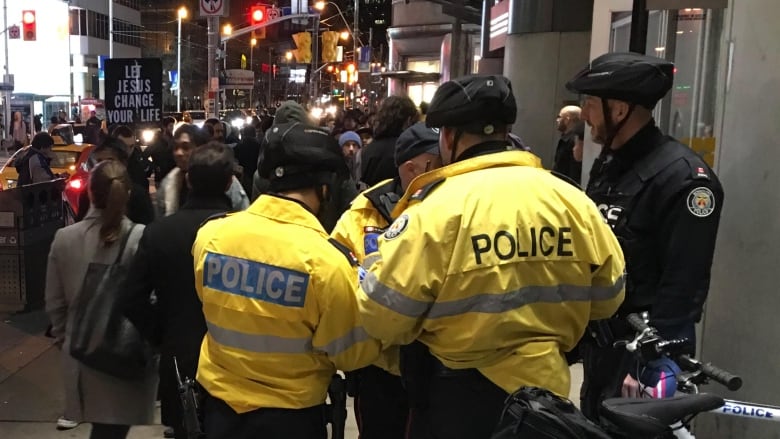'Dangerously low' staffing puts public safety at risk, Toronto police staff sergeant warns
Officer warns that as it stands, TPS isn't equipped to deal with major emergencies like a Danzig shooting

A Toronto Police staff sergeant says officers are at a breaking point when it comes to short-staffing at work.
In an exclusive interview with CBC Toronto's Metro Morning, a senior officer who works at Toronto police headquarters says things are getting worse, not better, as the force moves to modernize.
"Our staffing is dangerously low and the system that is in place right now isn't working," he said.
The staff sergeant contacted CBC Toronto following earlier coverage about an ongoing staffing shortage with Toronto Police, according to numbers provided by the service. CBC Toronto agreed to withhold the officer's name, to protect his privacy and his job.
"I can see the frustration. It's growing and growing," the staff sergeant said.
"There's guys who are calling in sick. They don't want to come to this. And I don't blame them … It's not good. It's not good for health, not good for family, not good for a platoon, not good for the morale of the service."
Officers, family coming forward
The staff sergeant is not alone in his concerns. In internal emails obtained by CBC Toronto, frontline officers have said they do not feel safe at work, with not enough police on the road to support each other when needed.
The wife of a frontline officer says she's afraid every day her husband leaves for work with fewer officers available to help him if he runs into trouble.
"I worry about that when he comes home and he talks about how little guys were on the shift today, how many guys called in sick because of being burned out, because of stress," she said in an interview with CBC Toronto's Dwight Drummond.
"I worry about that every single time he needs a day off because he is physically sick and he's going into work because there are not enough men on the road and he's worried about his brothers on the road."
CBC Toronto also agreed to withhold the spouse's name, as she feared her husband would face reprisals at work if his colleagues and superiors knew she had come forward.
Public safety a casualty of short-staffing
The staff sergeant says short-staffing is not only affecting officers, but public safety as well. In one instance, police received a call about a break-and-enter, with the suspect still at the home, but there was no one to send to the call.
"That's one example of many," the staff sergeant said.

"God forbid if something happens, like a Danzig shooting happens, in our city, sometime this week, next month, next year, we're done."
The staff sergeant is referring to the mass shooting on Danzig Street in Scarborough in 2012 that left two people dead and 23 others injured.
He says he would have to call on the support of another police force to respond to a call of that size, or else leave the rest of the city without police on the road.
"This service would be crucified because I don't have the resources to deploy these officers," he said.
Chief says he's addressing concerns
Toronto Police Chief Mark Saunders says he is aware of officers' concerns and is addressing them as the force moves to reduce its size by over 300 officers by 2019.

Last month, the chief sent an internal memo to the service highlighting his efforts to redeploy existing resources, moving 528 officers to frontline duty to address staffing concerns.
"These initiatives are part of our modernization efforts to create a new model of policing," the chief wrote.
"Once that model is in place, we can further look to consider what shifts, ranks and resources are required to fill each function."
Toronto Police are also calling for public input on how to modernize.
"We are inviting the public to share their views either by attending roundtable discussions or filling out an online survey so we can get their input during this assessment process," Deputy Chief Barbara McLean said in a news release.
Individuals can register online for the roundtable discussions taking place in various locations around the city or provide input in the Organizational Culture Survey.
